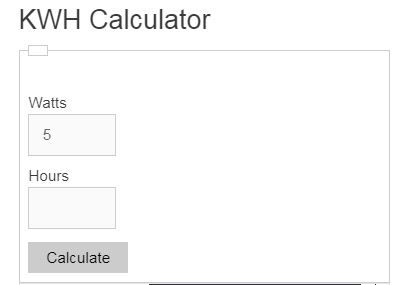Enter the total power in Watts, and the total time into the watts to KWH calculator to determine the KWH (Kilowatt-hours). This calculator can also determine the time or wattage if the other values are known.
- Gibbs’s Free Energy Calculator
- Power Calculator
- Enthalpy Calculator
- Electrical Power Calculator
- Electrical Appliance Cost Calculator
- kW to kWh Cost Calculator
- Cost Per Degree of Heating Calculator
- KWH to Cost Calculator
KWH Formula
The following formula is used to calculate KWH.
KWH = Watts/1000*hours
To calculate KWH, divide that wattage by 1000, then multiply by the total time in hours.
What is KWH?
KWH is short for kilowatt hour, which is a unit of measure of energy that is equal to 3.6 megajoules. More simply the kilowatt-hour is a measure of energy consumed or produced by one kilowatt sustained over 1 hour. The reason this unit has come to the forefront of most electric applications is that it’s used by electric utilities for billing.
A watt is a measure of power, and hours are a measure of time. Multiply power by times yields energy, and that’s why KWH is considered a derived unit of energy. It’s not officially recognized by the SI unit system, although the derived unit of joules is.
How to calculate KWH
Now that we know the formula for calculating kilowatt-hours, we can go over an example of how to calculate it. Let’s take the example of trying to calculate the KWH usage of a light bulb.
- First, you need to determine the total power consumption of the light bulb. For light bulbs, this is almost always shown directly on the package in watts. For our example, we will assume a standard 250-watt light bulb.
- Next, you need to determine how long the light bulb will run. This could be over its lifetime or a shorter period like a day. For this, we will calculate the KWH usage for one day = 24 hours.
- Last, enter the information into the formula or calculator above.
- KWH = 250/1000*24= 6 KWH.
- To use this information in a useful way, multiply that number by the cost of electricity in your home per KWH and you know the cost of running that light bulb for 1 day.
Similarly, we can do this for any appliance that uses electricity. This can be extremely helpful in determining your estimated electric bill. Let’s take a look at an example of an air conditioning unit.
- First, determine the power usage of the air conditioning. An average central air unit likely runs at approximately 3500 watts. A window unit likely runs closer to 500-1000 watts or less. We will assume ours is a central air unit.
- Next, determine how long it will run. We will assume a period of 7 days running 16 hours per day = 112 total hours.
- Enter the hours and power into the formula to calculate KWH.
- KWH = 3500/100*112 = 392 KWH.
- Now multiply that number by the cost per kWh of electricity to calculate the cost per week of your AC
KWH Usage in Cars
The term Kilowatt-hours has become more and more prevalent over the last 5-10 years, and that’s mostly due to one thing…cars. More specifically, electric cars. Electric cars have made a sudden surge in the last 5 years, due in part to the carmaker Tesla, which is delivering thousands of cars every week. Electric cars are starting to appear more and more and you guessed it, they run on electricity. And what term is used with electricity? You guessed it, KWH.
In the same way that appliances use electricity, so do electric cars. Cars consume electricity in the form of power from batteries stored on the undercarriage. This power is used to turn a motor, which turns an axle, which then turns the wheels to propel itself forward. Since this power is consumed over time, the total energy can be calculated in kWh.
The KWH of an electric car is usually specified as a metric to show off the power of a car, but in terms of range, it does not mean much. An electric car with a lower KWH could still drive much further. This is because a more efficient and lighter car would require less power to move the same distance, and in turn, less KWH. This is very important to keep in mind when purchasing an electric car.
For more science and physics calculators, click here.
